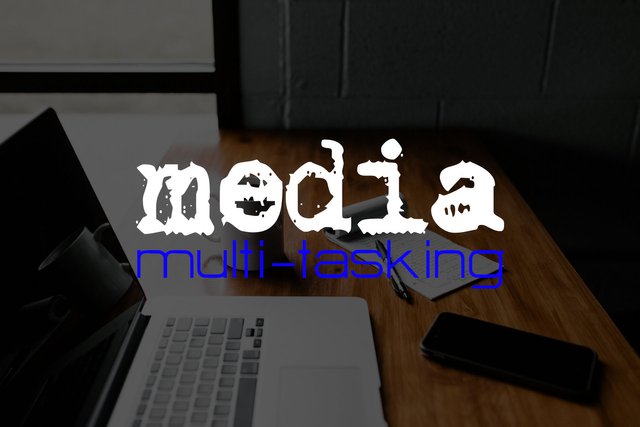Media Multi-Tasking

'In an effort to be connected, our teens are losing the ability to connect...'
- Anon
I love getting nostalgic when I write. It makes me remember when times were simpler, when we used to walk 20km to school in 2 metres of snow with nothing but a thin cotton rag keeping us warm. Or how we used to ride the bus on a bumpy road while suffering from piles because it toughened us up. Do you remember those days too? No? Maybe, yes? Well, in truth, I don't actually remember times being that tough, mainly because times weren't that tough. Thankfully.

I do remember though, while growing up, the only media that I had available (when Dad wasn't watching it) for entertainment was a television with 5 channels (often 4 because if you didn't have a decent aerial, you could never pick up SBS - and even if you could, you never watched it because it was the channel that aired all of the foreign shows, and it was annoying trying to watch a show and read the subtitles at the same time!). Broadcasts often cut out, which was a pain, because they inevitably cut out right when you finally got to sit down and watch the 'parent-approved-show-for-the-evening', and the stations rarely remained open after 10:30pm. I remember that they even printed the station close time in the TV Giude, which, at that time, you would be left with nothing but 'snow' or some sort of a test pattern (which, incidentally, left me fascinated. How did they determine what needed to go on that thing?!).
There is no doubt that we live in exciting times. The progression that technology had made in recent years is nothing short of amazing. Every day, new discoveries, inventions and innovations. Who would've ever dreamed that it would be possible to lay in bed and use your phone to turn on the coffee machine just before setting your alarm to snooze for another 10 minutes (believe me or not, I don't actually do this, but one day I will!)? Would you have guessed, when you were young, that it would eventually take you longer to select something to watch on television, than it used to take you to watch a show (c'mon, who else settles in for a round with Netflix, only to find that sometimes the choice is actually too overwhelming)? Neither of these things, or the plethora of other possibilities were possible for me as a youngster. But they are now.
I struggle sometimes with technology. I struggle with making a choice - picking a show for any given night, for example. I struggle with the laziness that technology can quite easily breed - actually reading something I've written looking for contextual spelling mistakes, or allowing the in-built spell check do it for me, knowing full well it cannot tell the context in which I've used 'their'. I even, sometimes, struggle with the bombardment of news that plings my phone to life every minute or two.
So contemplate now, if I, we, as adults, struggle with this, how much more difficult is it for the younger generations who have never known any different? For those of us probably 30 or over, we experienced very different times.We grew into technology and saw it develop over decades. Many school-aged people had technology thrust upon them, not as an option, but as a necessity. One of the things I ponder is: What is the effect of this? Am I being melodramatic, or is there cause for concern?
What is Media Multi-tasking?

In a nutshell, multimedia multi-tasking (for brevity, let's use MMT from here) is the practice of using several devices at the same time1. So, for example, you might be watching television whilst browsing the internet on your laptop, while using your phone to message. Convoluted, huh!? Me, I can't do this. I need to focus on one thing at a time. My wife says it's because I'm male. I say it's because I like to do one thing properly rather than 3 things poorly. The debate still rages! You can chime in if you like, but I understand if you would rather remain neutral.
However, I digress. MMT has been subject to much research in recent years, and the results seem a little mixed. On one hand, it is deemed that students who multi-task get distracted easily and are more likely to be off task, but other studies allude the idea that this ability could actually be beneficial. While both sides of the mixed thoughts on this subject feel valid, it seems that those who see this as having a negative impact are being proven correct more than those who support positive arguments. One study, in particular, aimed to test whether heavy MMTer's night have an improved ability to filter out distracting information over light MMTer's. Not surprisingly, they discovered, that this was in fact not true at all. Subjects (students) that were more prone to MMT, displayed a greatly reduced ability to ignore distractions and focus on pertinent information2.
Of all the potential side effects of MMT, perhaps one of the most pertinent ones to teachers, is the toll that constantly dividing one's attention can take on learning3. A study conducted at the University of London found that multi-taskers have a lower IQ of up to 15 points, and that they often scored lower in examinations and other learning activities. Further to this, research has found that students who sit near to multi-taskers can also suffer harm to their learning. The reasons for this, stem from the fact that our brains are not actually 'wired' to multi-task well4. It is explained in the same study, that when people think they are multi-tasking, they are actually just switching from one task to another very rapidly, and as a result of this, there is a cognitive loss. This means you are not really retaining (all) the information from each task as you switch (I think I'll show this study to my wife!!).
What are the Effects

The final paragraph of the previous section presented the fact that those who multi-tasked were likely to have a lower IQ, preform worse in learning situations and not retain information. All of which is true, however, is likely just scratching the surface. People who practice MMT can also find themselves quickly becoming socially inept, something alluded to in the opening quote, and can even, quickly become addicted to it.
Jumping back and forth between tasks can often make people feel a sense of accomplishment, which can be understandable. Imagine you are working on three tasks at once and get all of them finished, as opposed, to a person who might be working on only one task in the same period of time. A bystander might be inclined to say that finishing three tasks versus one task is more productive. But remember, it isn't the number of jobs you get done, it's how well you get them done, and as we read earlier, if you're jumping from task to task, you're actually not retaining a lot of the information required to finish all tasks well.
Relate this now to school work. A student completing homework is also watching television, surfing the net and listening to an mp3 player. How much of that homework information is actually being retained? 10 percent, maybe 15, if they're lucky? Have you ever been baffled as to how one of your students cannot remember the homework that they completed the night before, and questioned as to whether they really did it at all. Perhaps the chances are they did, but they actually cannot remember it. Which can be explained by Sophie Leroy, a professor at the University of Minnesota, who writes:
People need to stop thinking about one task in order to fully transition their attention and perform well on another. Yet, results indicate it is difficult for people to transition their attention away from an unfinished task, and their subsequent task performance suffers5.
Well, how is this addictive? For multi-taskers in general, the instant gratification that comes from accomplishing a task, can form a sort of destructive loop, whereby you force yourself to work concurrently on more tasks, due to the deceptive belief that you are producing at an optimal rate6. For someone who finds they indulge in MMT, it would be the fact that the feel as though they are being a social butterfly as opposed to being locking constantly in their room while completing homework or some other perceivably mundane task.
Which brings me to the idea that MMT is breeding a culture where teens feel they are more connected than ever, but in fact, they are actually unable to connect at all. You may remember The Facebook Song by Rhett & Link that made the rounds a decade or so ago. In it they sang about the addictiveness of Facebook, and mocked how if it ever went down, they would have to walk around with their profile drawn up on a piece of paper for everyone to read. Hilarious song. I've embedded it below if you'd like to listen (I suggest you do!).
I find that, despite not being about MMT, this song highlights some of the associated problems with MMT that have been discussed thus far. It particularly shows that we are becoming a socially clumsy society. MMT causes the parts of the brain we use to connect face-to-face to become disengaged, effecting the way we interact when not shielded by a little black screen, and I don't really need to spell out what happens the less we do something.
Let's Wrap Up
Don't despair, though! All is not lost. We can slowly attempt to pull these students back from the brink of a complete lack of social skills. How? By assisting them in practicing deep work. Deep work is where someone focuses intently on a cognitively demanding task without distraction. However, for this to be effective, there must be no distractions.
About 10 years ago, the time that I first really embraced online ordering, I thought I'd conduct a mini social experiment. I wondered if I could go for an entire day without talking to another person. I will admit, I did cheat a little - in as much as I selected a day when I knew there would not be anyone else in the house, so as to make the task a little easier.
I only ordered and paid for food online and left a note stuck to the front door instructing the driver to simply leave the order on the doorstep (I drew a smiley face so they didn't get offended :)). I didn't leave the house for anything, in case any neighbours were outside, and I certainly didn't venture to the shops (I could be wrong, but I don't remember self-serve checkouts being around then, so I would've had to talk to the cashier). I pretty much was cut off for a 24 hour period, and I know, that by today's standard, this is probably not very long at all. What I remember, and this is my point here, is that I began to feel cut off and lonely, after only 24 hours.
Imagine, for a second, how it must feel to be cut off for much longer than that. I can't imagine being a slave to my phone, or computer. Don't get me wrong, I love them, but I could probably still live without them, and I certainly don't multi-task with them, and whenever I do, nothing much is accomplished. But there are people who are. They cannot put them down.Nomophobia is real. Look it up. Or click the link!
As always, thank you for reading - your support is appreciated. I hope that you took something positive away from this post. If you have any comments or feedback, please leave it in the usual place and I'll get back to you. Maybe you are someone who is 'guilty' of media multi-tasking, or maybe you agree with my wife, or maybe you just have something else to say. Either way, I welcome the comments.
Thanks for your time.
References
- MacMillan Dictionary
- Media Multi-Tasking: Effects on Student's Attention
- The Impacts of Media Multi-tasking on Children's Learning and Development
- Media Multi-tasking Not Only Reduces Performance but also IQ
- The Effect of Regulatory Focus on Attention Residue and Performance During Interruptions
- These Are The Long Term Effects of Multi-Tasking
- All images taken from Unsplash.

Join us @steemitbloggers
Animation By @zord189

I recall back then when mobile phones are so rare only the rich were able to afford them along with the monthly fee. We struggle to look for a phone booth just to make a call. The good part about it you could make a lot of excuses lol. Times have changed indeed and I felt it was just like yesterday. Now it's so hard to pull my kids off their phones. Thanks for sharing about MMT I do strongly believe in quality more than quantity. Something I would share about to my kids.
Thanks for the comment @watersnake101. I was too young to remember when they first came out, but I have seen images of the ones that had a battery so large it was like carrying a brief case. When my parents first got one, it came with two detachable batteries - one on the phone, the other in the charger getting prepared.
Times have definitely changed!
I'm yet to reach the joys of having kids with phones - mine are still too young, but I'm sure it's a battle I'll have to face in the next decade or so.
I am glad I grew up before all the techy items no telling what my life would be like. In some ways better but who knows.
Yeah, it's one of those things, isn't it? Would life have been better, or more complicated? I'm somewhat of a fence-sitter, I think. On the one hand, I'm glad I experienced the 'simpler' life of little gadgetry, but then, I really enjoy the technological advancements that have been made in recent years too.
We are more mature...think as children it may have opened doors good or bad.
Hi steveblucher,
Visit curiesteem.com or join the Curie Discord community to learn more.
Thank you @curie. This is a pleasant surprise.
Congratulations @steveblucher! You have completed the following achievement on Steemit and have been rewarded with new badge(s) :
Click on the badge to view your Board of Honor.
If you no longer want to receive notifications, reply to this comment with the word
STOPTo support your work, I also upvoted your post!
If you would like to support the educational community by delegating to @steemiteducation, please click on any of the following links. This will ensure that more teachers are supported on a daily basis.
100SP 200SP 300SP 400SP 500SP 750SP 1000SP 2000SP 3000SP 4000SP 5000SP 10,000SP 25,000SP